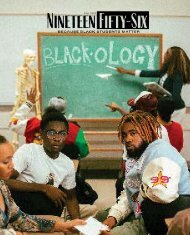Nineteen Fifty-Six Vol.4 Issue 2
Our latest magazine issue, Rooted, delves into the complexities surrounding the black family and the stigmas that often accompany conversations about it. From generational trauma to stereotypes perpetuated by the media, we examine the challenges faced by black families and the resilience and strength that bind them together. However, Rooted also celebrates the beauty and richness of black family life and culture, showcasing the love, unity, and traditions that make these families truly unique. Join us as we explore the multifaceted narratives of the black family and honor their history and heritage.
Our latest magazine issue, Rooted, delves into the complexities surrounding the black family and the stigmas that often accompany conversations about it. From generational trauma to stereotypes perpetuated by the media, we examine the challenges faced by black families and the resilience and strength that bind them together. However, Rooted also celebrates the beauty and richness of black family life and culture, showcasing the love, unity, and traditions that make these families truly unique. Join us as we explore the multifaceted narratives of the black family and honor their history and heritage.
Create successful ePaper yourself
Turn your PDF publications into a flip-book with our unique Google optimized e-Paper software.
The oversexualization and fetishization of Black<br />
children is not a new phenomenon but one that<br />
has begun to interest scholars in recent years.<br />
Current scholarship has shown that Black children are<br />
often hypersexualized more than children of other<br />
races. An article published in The Observer detailed the<br />
discourse on the topic, stating that “The treatment and<br />
imposed expectation of how Black children should act is<br />
a loss of their innocence.”<br />
This unconsciously manifests in Black communities in<br />
many ways. Makayla McLaughlin, a sophomore majoring<br />
in history, said the oversexualization of young Black girls<br />
needs to be discussed more.<br />
“Every Black girl I know has a story about an uncle they<br />
can’t go around, or how they have to cover up around<br />
family, or can’t dance in a certain way,” McLaughlin said.<br />
“It’s so normalized that people don’t see that it’s weird.<br />
There’s no reason to police what a 5-year-old girl is doing<br />
like that, but it happens all the time.”<br />
K.T. Ewing, an associate professor in the department of<br />
gender and race studies, said the sexualization of Black<br />
children is rooted in slavery and the dehumanization of<br />
Black bodies.<br />
“As people who were brought to this country to be<br />
laborers, Black women, and therefore Black children<br />
and Black men, of course, are immediately denied<br />
personhood,” Ewing said.<br />
The oversexualization of Black children may, also, be<br />
connected to the high rates of sexual violence they face.<br />
According to the National Center on Violence Against<br />
Women in the Black Community, the rates of sexual<br />
violence towards young Black women are higher than the<br />
national average. 1 in 4 Black girls under 18 will likely be<br />
sexually abused, and 40-60% of Black girls under 18 have<br />
reportedly been coerced into sexual contact.<br />
However, there is little acknowledgment of Black boys in<br />
statistics concerning sexual violence, but that should not<br />
be an indicator that it is uncommon.<br />
“Sexual violence against Black men and boys has remained<br />
a routine, and historically denied, aspect of anti-Black<br />
racism,” wrote Tommy Curry, a Black male studies<br />
professor at Texas A&M University in his 2017 book “The<br />
Man-Not: Race, Class, Genre, and the Dilemma of Black<br />
Manhood.” “Despite the violence that defines their lives<br />
under racism, their stories and these public displays of<br />
racism’s sexual components remain an unapproachable<br />
area of study under our current disciplinary arrangement<br />
of knowledge - specifically, the gender category itself.”<br />
Stacey Patton, a research associate at Morgan State<br />
University, said that sexual violence towards young boys<br />
has become normalized and examines a few celebrity<br />
examples.<br />
“In more recent times, Black male artists will talk about<br />
having their first early sexual experiences as little boys,”<br />
Patton said. “Lil Wayne is someone who’s talked about it<br />
a lot.”<br />
Patton said the issue has been reframed as a rite of passage<br />
into masculinity that some male adults encourage or even<br />
initiate for their young sons.<br />
“Then you have, more recently, these artists who rap<br />
about exposing their sons to having sex with strippers<br />
and prostitutes as a way to introduce them into masculine<br />
sexuality early on for fears that their boys may be gay,”<br />
she said.<br />
22
















